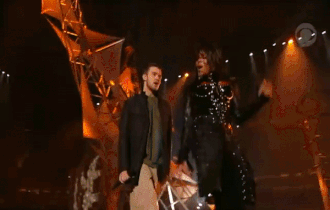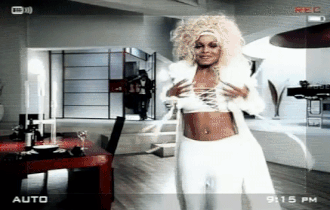Released: 12th April 2004
Writers: Janet Jackson / Dallas Austin
Peak position: #15
Chart run: 15-29-33-42-53
Billboard Hot 100 chart run: 47-45-45-58-78-90
Every so often comes one of those career-defining moments that – for better or worse – alters an artist’s career trajectory. But in Janet Jackson’s case, the deafening furore surrounding Just A Little While had very little to do with the song itself.

It’s fair to say that Janet Jackson’s eighth album campaign didn’t get off to the smoothest of starts. Damita Jo was a long time in the making – around 18 months – and was conceived without any distinct musical direction; at one point, it was described by co-producer Jimmy Jam as being ‘all over the place’. Many of the announced collaborations didn’t make the final cut, but by early-2004, things were just about ready to go, and there was a positive buzz around the project. Not least because Janet Jackson would be headlining the coveted Super Bowl XXXVIII halftime show, with upwards of 130 million viewers expected to tune in. There could scarcely be a more prominent platform to build some momentum for the lead single, even though it was yet to be formally announced. But plans were thrown awry when Just A Little While leaked. The track was already starting to pick up airplay, and Virgin Records had little choice but to try and take back control. So, a digital release was arranged, and a music video hastily filmed. If only that had been the biggest challenge to overcome…

Nobody would have wanted Just A Little While to emerge like this. Not just because it was Janet Jackson, though that would have been frustrating enough, given her high profile and how long she’d been working on the album. This was her first single not to be produced by Jimmy Jam and Terry Lewis since 1990’s Black Cat, so whether intended to lead the campaign or not, Virgin Records would undoubtedly have wanted to tread carefully and test the waters. Helmed by Dallas Austin, this was quite the swerve as Janet Jackson appeared to be launching wholeheartedly into her mid-’00s pop-rock era with a song that packed funky, thrashing electric guitar riffs (she wasn’t. Just A Little While is very much the outlier on Damita Jo). And it’s bloody brilliant.

With little forewarning, the track left a few people scratching their heads, which is entirely understandable because it doesn’t fit cohesively within Janet Jackson’s back catalogue. Furthermore, there was a lot of breezy, sun-drenched pop-rock like this around at the time, which led to assertions of this being a lightweight, disposable effort, which would’ve been fine for the acts emerging to fill that space, but less so for someone with Janet Jackson’s stature. But it’s possible to appreciate Just A Little While for what it is without depreciating the value of her legacy. This is a woman in an incredibly positive space, and that can be heard through every fibre of the track, which exudes carefree, giddy joy.

If Janet Jackson was happy, then that also meant she was having good sex. And why shouldn’t she tell us all about it? Her willingness to openly discuss sexuality had always drawn a sharp intake of breath from some commentators. Still, the conservative attitude that equated it with something bad or taboo is precisely why she talked about it. There’s no doubt whatsoever that lyrics like: “I don’t want to be a distraction to you, no, no, NO, so maybe I’ll just lay around, play by myself, while touching on my favourite fru-ooh-ooh-UIT!” or: “Baby, I know we did it all night long, and I didn’t want to burn you out, ‘cos you know how much I like to do it, in the morning it’s another round” are delivered with complete sincerity. Most importantly, Janet Jackson makes sex sound fun, which is the whole point, yet one that often gets lost when treating it as an abstract concept.

And that extends to Just A Little While as a whole. The grin-inducing chorus is laden with catchy hooks and peppered with playful ad-libs: “Can’t stop thinking ’bout the things we do, and how it feels making love to you, I’m ready to get it, baby, if you got it to dish out (yeah-eah), just love me for a little while…”. The punchy production ensures Just A Little While never comes across as taking itself too seriously. And, quite frankly, Janet Jackson feeling liberated enough to whisper: “You make my juices flow” over the outro (okay, maybe that one is an over-share) shows the kind of confidence that should be a source of aspiration, not disgust. Interestingly, by the time this single reached the UK, it came with a new radio edit, which appears to exist for no other reason than there was just a bit more time to finesse the track. The overall charm of Just A Little While remains unchanged, but the rockier elements are softened (quite literally, as the song becomes oddly muffled after the first chorus), with a more synthesised, electro instrumental used instead. The vocals are also a little cleaner, and there’s a more audible harmony during the chorus. It’s not entirely clear why these changes would appeal specifically to the UK over any other territory, so perhaps it’s simply the case that this is how Just A Little While was intended to be all along.

Even though plans for the music video were brought forward to compensate for the song leaking ahead of time, the result is not something that looks like it was hastily thrown together. It does, however, continue down the path of presenting Janet Jackson in a slightly different light, which was either going to underline Just A Little While as endearingly likeable or a betrayal of her persona. In it, she’s shown creating home videos in a swanky, futuristic apartment which have then been patiently converted to DVD (no mean feat in 2004) and posted out for her lover to watch. Forget slick choreography; here, an adorably dorky Janet Jackson totters around in high heels trying to vacuum the carpet and unconvincingly prepare a meal while serving some absolute looks. Sure; this is not necessarily a visual you’d use as the best example of why she’s an undisputed icon – the finale features her being gifted a kitten by her beau – however, as a summation of the angle that Janet Jackson was coming at with Damita Jo, it works very well indeed.

Although Just A Little While wouldn’t be performed at the Super Bowl, this was still the pièce de resistance of promotional platforms. The video was planned to drop the following day and would undoubtedly benefit from the guaranteed spike in Janet Jackson’s profile. At least, that was the plan. But what happened next is a moment permanently etched into the fabric of popular culture. Before that, it’s worth pointing out that her halftime show was phenomenal. Rarely does anyone talk about how well the featured tracks – All For You, Rhythm Nation and the breakdown from The Knowledge – were realised on an ambitious set with tight choreography; she owned that moment. Then, Justin Timberlake was revealed as a surprise guest to close the show with Rock Your Body, while Janet Jackson took the: “Talk to me boy” parts. There was some context to this; she’d previously contributed backing vocals on the track (And She Said) Take Me Now from his debut album, and there were whispers of them potentially recording a duet. At the end of the song, the pair ascended to the centre of the stage; Justin Timberlake reached across and pulled Janet Jackson’s bodice, revealing her right breast, adorned with a sun-shaped nipple plate. The image, broadcast for less than a second, became the most searched in internet history and caused, to put it mildly, an absolute uproar.

To this day, the official line is that the incident was unplanned, and Justin Timberlake had intended to reveal Janet Jackson’s red lace bra. Whether the timing (“Bet I’ll have you naked by the end of this song”) and ornate adornment of her nipple was merely serendipitous bad fortune or not, there is no question that what followed was a hysterical overreaction. MTV and CBS apologised, claiming they didn’t know it would happen (although MTV was involved in the plans for a costume tear). Justin Timberlake tried to brush it off, but at the network’s behest, he and Janet Jackson quickly released grovelling apologies – coining the term’ wardrobe malfunction’ in the process – expressing their regret for unintentionally offending. The federal government agency responsible for TV regulation received over half a million complaints and issued CBS with a $27,500 fine for every one of their channels simulcasting the event, which totted up to around $550,000. The fine was overturned in 2008 as an ‘arbitrary and capricious’ kneejerk reaction. It was stupid, basically.

Things went so much further than that, though. The fallout of Nipplegate meant the media suddenly became paranoid that exposure or vulgarity of any kind – regardless of context – could be deemed offensive. Particularly as the government quickly spearheaded a bill that increased the maximum fine for broadcasters to $325,000. Broadcast delays for live events were introduced, while many TV shows were re-edited to censor…well, pretty much anything that would imply they were complicit in the scandal. There’s an argument to say that some of the response was overdue: the Teen Choice Awards were purged of sexual content and profanities, but why would that even need to be there in the first place? This was a point where every media outlet paused to have a good look at themselves and check whether they’d simply become desensitised to casual sexualisation and objectification. As it turns out, most of them had.

The sting is that all the vilification was directed at Janet Jackson, while Justin Timberlake largely got off scot-free, and there is no reading of what happened that makes this okay. If it was a genuine accident, then Janet Jackson had been left exposed and embarrassed in front of hundreds of millions of people, so outrage was not the right or compassionate response. If the stunt was planned, then both acts – and their teams – were equally culpable since the performance had been meticulously rehearsed. In recent years, the double-standard that saw Justin Timberlake’s career flourish while Janet Jackson’s nosedived has been, quite rightly, questioned. He has since apologised – again – but this time for his inaction over the fallout. However, Janet Jackson also revealed that she advised him to keep his head down because that would merely have meant two artists’ careers being jettisoned. Rather than retrospectively shift or split the blame, a better conclusion would be that everyone should probably have just calmed the f**k down a bit. Alas, nothing about the response was measured.

And that’s really where Just A Little While – and indeed, the Damita Jo album – came to signify just how much the Super Bowl ripped through Janet Jackson’s career. Viacom (CBS’s parent company) immediately banned her from all their networks, including MTV, VH1 and many radio stations across America. Thus, although the initial signs pointing to this being a warmly received airplay hit, Just A Little While was immediately stifled. It stalled at #45 on the Billboard Hot 100 and became one of Janet Jackson’s worst-performing singles at that stage. During any scheduled promotional appearances that weren’t cancelled, there was only one topic anyone wanted to talk about, and it wasn’t the music. Just A Little While fared better in the UK, peaking at #15, but even without a media boycott, the campaign was still playing out under the shadow of interviewers trying to find an angle on what had gone down. Not least because Damita Jo was an album where Janet Jackson openly embraced and explored sexuality, again challenging the attitude of this as being something shameful. Despite requests to tone down the lyrics (songs like Sexhibition, Warmth, and Moist must have sent Virgin Records into a cold sweat), she pushed back. This is the album Janet Jackson wanted to put out and – despite the heightened rhetoric – she was not about to censor herself for anybody. That is why she’s an undisputed legend.

Of course, another narrative was already in motion, and Damita Jo debuting at #2 in America conveniently cemented the backlash against Janet Jackson that was being constructed. Yet first-week sales of 381,000 – even in the absence of a hit lead single – were strong enough to have taken the top spot on many other weeks during the year. It’s just rather unfortunate that she went up against Usher’s recently released Confessions, which sold over a million copies to debut at #1 the previous week and would be the year’s biggest seller by a significant margin. There might have been an opportunity to save face if Damita Jo had sold well outside of America, but it opened to a tepid reception elsewhere, including a peak of #32 in the UK. This would have been a far less a bitter pill to swallow if it transpired the album was, in fact, a clumsy misstep. But Damita Jo was pretty good, which even the critics acknowledged when they got around to discussing the material itself. And therein lay the problem: reviews were critiquing Janet Jackson, with the music sometimes now little more than a footnote. And even if songs like All Nite (Don’t Stop), R&B Junkie, I Want You, or SloLove could show some substance to the album, few platforms remained to get the songs out there for people to hear. Virgin Records committed to playing the long game with Damita Jo, but realistically, there wasn’t anywhere for them to go as almost every door had been slammed shut on Janet Jackson.

The ripples of the Super Bowl were felt for a long time. Just A Little While certainly wasn’t the only song to bear the brunt of the incident; indeed, it wasn’t until 2015’s warmly received Unbreakable that Janet Jackson’s critical and commercial exile truly seemed to end. But this was the one caught in the eye of the storm, offering a unique glimpse at a single crafted without any awareness of the circumstances that would dictate its fate. Would Just A Little While be considered an all-time Janet Jackson classic if things were different? Probably not, though that’s more a reflection on the towering quality of her back catalogue than anything else. It is, however, a delightfully energetic burst of upbeat pop music. And that is precisely how the song deserves to be remembered.



